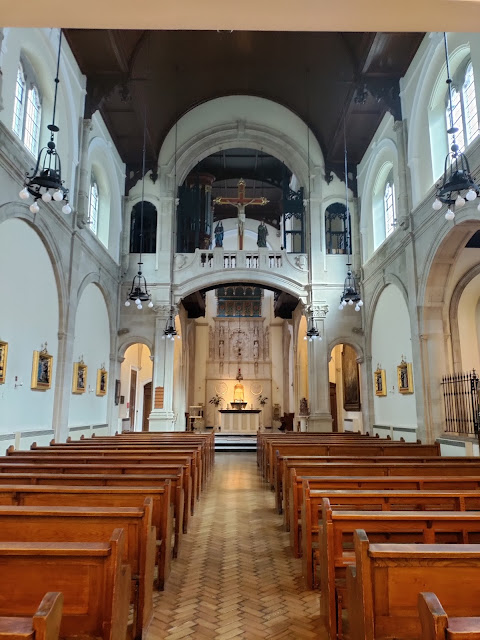London isn't just about pubs, whether in Tower Hill, Soho, Marleybone, Fleet Street or anywhere else, it's also about churches, and I took the time to visit a few. Corpus Christi Maiden Lane, just off Covent Garden, stood out. A beautiful catholic church, full of the beauty and sense of holiness.
As soon as you enter this hidden away gem of a church you're struck by the hushed reverence of the place, a haven from the secular rush outside. You'll note Corpus Christi doesn't have a knave altar. I lit a candle and prayed.
St. Mary le Strand is Church of England and stands on the Strand opposite King's College, it's an architectural masterpiece designed by James Gibbs, replacing an earlier church which was demolished in 1549 to make way for Somerset House. The new St. Mary's was consecrated in 1724 and, curiously, I'd never been inside, despite walking by it daily while at King's. What was it like?
Walk a few minutes east to Fleet Street Street and St. Bride's, the journalist's church. I'd never been there before, oddly, and was somehow moved by the calmness of the place, its sense of reverence, and lit a candle. After visiting the church you can visit a pub, the Old Bell, built by Christopher Wren and pleasantly unspoiled.
Heading back west, walk north up the Kingsway to St. Anselm and St. Cecilia's, a Roman Catholic church and yet another shelter from the storm of people rushing, in this case, into the vastly expanded maw of LSE (London School of Economics). It's an austere, simple church and I prefer Corpus Christi, still, Christ is most definitely present
Then return to your set up on the Strand via Lincoln's Inn, get ready to meet old friends and wonder at the sheer number of churches in this small section of the city, the above's just a snapshot.
They weren't built from a lack of faith, may that return again.
God bless,
LSP






